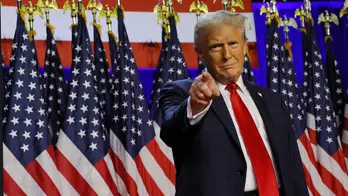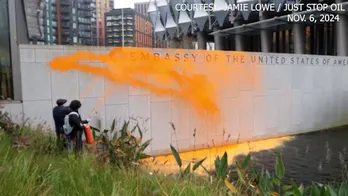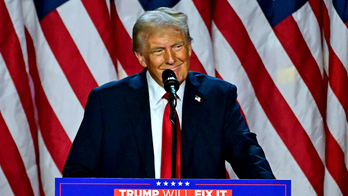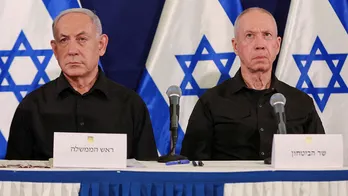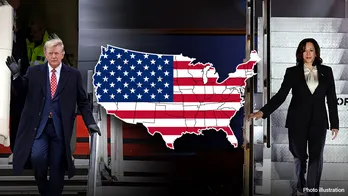Taiwan's President Tsai meets Kevin McCarthy despite China's warnings
SIMI VALLEY, Calif., and TAIPEI — Taiwan's President Tsai Ing-wen vowed Wednesday to "defend the peaceful status quo" in which the people of Taiwan can continue to thrive in a free and open society. Her remarks came after a meeting with House Speaker Kevin McCarthy that Beijing had warned against.
Speaking in a joint appearance with McCarthy before a bipartisan group of U.S. lawmakers at the Ronald Reagan Presidential Library outside Los Angeles, the Taiwanese leader also thanked the U.S. for its support to Taiwan.
The "unwavering support," Tsai said, "reassures the people of Taiwan that we are not isolated, we are not alone."
"To preserve peace, we must be strong," Tsai said, paraphrasing the late U.S. President Ronald Reagan's policy of "peace through strength."
Among the Democratic and Republican officials present were Wisconsin Republican Mike Gallagher and Illinois Democrat Raja Krishnamoorthi, co-chairs of a new House select committee that focuses on China.
Outside the venue, a few dozen people staged protests against Tsai's visit and counter-protests in support of her, while a propeller plane flew circles above the estate, trailing a banner that said: "One China; Taiwan is a part of China."
Beijing is angry about the meeting, but some say the venue choice signals compromise
Ahead of Tsai's visit to California, China labeled her planned meeting with McCarthy as a "provocation" and threatened "countermeasures" should the meeting go ahead. On Saturday, China's People's Liberation Army began live-fire joint force training exercises for its air force, navy and ground forces.
The Chinese Embassy in Washington on Tuesday urged American lawmakers not to meet Tsai. "I have to point out that China will not sit idly by in the face of a blatant provocation and will most likely take necessary and resolute actions in response to the unwanted situation," an embassy representative wrote to lawmakers.
But some analysts see the California meeting as an effort to tame Beijing's temper — since it is not taking place in Taipei, which was what McCarthy had originally proposed. Last summer, China conducted unprecedented military exercises around Taiwan following former House Speaker Nancy Pelosi's controversial visit to the island.
"The Chinese should be relieved that McCarthy is not going to Taiwan," said Bonnie Glaser, a China expert at the German Marshall Fund, a think tank in Washington, D.C. "But there could be a perception in Beijing that they have to up the ante and they have to, they want to be taken seriously by the United States and by Taiwan, that they can't look soft."
National Security Council spokesperson John Kirby said Washington is closely following Beijing's reaction. "We'll watch this as closely as we can, of course we will, and we'll always make sure that regardless we maintain and have the requisite capabilities and resources to preserve peace and stability in the Indo-Pacific."
Tsai is to step down next year, but her visit "is not simply a graduation trip"
For Taiwan, Tsai's stop in California and her meeting with McCarthy serve as reassurance that the U.S. — by far the island's most important partner, even though it does not officially recognize Taipei — remains firmly supportive of the island. She is due to step down next year and will not seek reelection.
"Tsai's trip is not simply a 'graduation trip' [as she finishes her term]. It is definitely an assist for raising the foreign diplomacy of Taiwan," says Lin Ying Yu, an international relations professor at Taiwan's Tamkang University.
"Although sometimes the U.S. will make some so-called concessions and interact with China, Tsai's meeting with McCarthy shows the U.S. will stick to its bottom lines and will not let China manipulate it on cross-strait issues," says Lin.
These reassurances will be reinforced later this week, when a bipartisan U.S. congressional delegation led by House Foreign Affairs Committee Chair Michael McCaul is due to meet with Tsai on Saturday in Taipei, the day after she returns from her meeting with McCarthy.
Not everyone in Taiwan is pleased about Tsai's U.S. trip
Some in Taiwan have been wary about the island's closer ties with the U.S.
As Tsai began her visit to Central and North America last week, her predecessor, Taiwan's former President Ma Ying-jeoh, was wrapping up a tour of various Chinese cities — the first time ever that a retired or former Taiwanese leader has visited mainland China.
"People on both sides of the Taiwan Strait are [ethnically] Chinese people, and are both descendants of the Yan and Yellow Emperors," Ma declared during a highly emotional pilgrimage to his family's ancestral tomb in China's Hunan province.
It is a reminder that despite political tensions, there are still close cultural and economic links between the two sides of the Taiwan Strait, says GeorgeYin, distinguished research fellow at the National Taiwan University in Taipei.
"But it's also an opportunity for Beijing to react rationally. If Beijing overreacts, it'd be seen as further destabilizing the already tense bilateral relationship with Washington. It could trigger another wave of anti-China sentiment across the U.S. political spectrum," Yin says.
Ruwitch reported from California and Feng reported from Taipei. Vincent Ni contributed to this report from Washington, D.C.
Disclaimer: The copyright of this article belongs to the original author. Reposting this article is solely for the purpose of information dissemination and does not constitute any investment advice. If there is any infringement, please contact us immediately. We will make corrections or deletions as necessary. Thank you.

